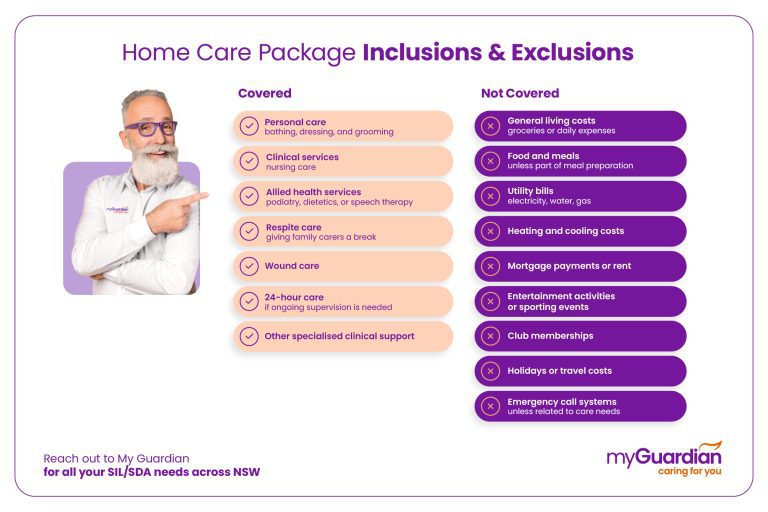Must-have qualities in exceptional home care package providers
Must-have qualities in exceptional home care package providers
Blog Article
Everything About Home Care Solutions for People With Disabilities: NDIS Registered Assistance
Home care services under the NDIS play a critical role in supporting individuals with handicaps. These solutions are created to boost day-to-day living with customized assistance, varying from individual like wheelchair support. Recognizing how to navigate these choices can be complex. This summary explores the different facets of NDIS home care, from available services to the option of providers, highlighting important factors to consider for those seeking assistance. The journey towards empowered care begins below.
Recognizing the NDIS and Its Objective
The National Handicap Insurance Coverage System (NDIS) works as a transformative structure made to offer assistance and services for people with specials needs. Established to enhance the lifestyle and guarantee fair accessibility to essential resources, the NDIS empowers individuals by using personalized strategies customized to their one-of-a-kind demands. It aims to foster independence, enabling people to pursue their personal objectives and aspirations.Through a structured technique, the NDIS allocates funding for different assistances, consisting of education and learning, work support, and area involvement. This all-encompassing plan not only concentrates on instant care but additionally stresses long-term developmental end results. By advertising choice and control, the NDIS motivates participants to pick their recommended solution companies, ensuring that treatment straightens with their values and preferences. Ultimately, the NDIS stands for a considerable commitment to improving the lives of individuals with handicaps, promoting inclusivity, and building an extra supportive society.
Kinds of Home Treatment Services Available
Various kinds of home care solutions deal with people with disabilities, mostly concentrating on personal treatment help and break treatment choices. Individual care help provides important assistance with daily activities, while respite treatment uses temporary relief for primary caretakers. Recognizing these solutions is essential for making certain the wellness of both people with impairments and their family members.
Personal Care Support
While maneuvering day-to-day live can provide difficulties for people with disabilities, personal treatment help provides important support tailored to their distinct requirements. This type of home care service incorporates a variety of activities created to promote freedom and boost lifestyle. Personal treatment aides assist with day-to-day jobs such as bathing, clothing, brushing, and toileting, guaranteeing individuals maintain individual hygiene and convenience. They might additionally assist with dish preparation, medication management, and flexibility support. By providing customized care, these experts encourage individuals to involve even more totally in their everyday routines and social activities. Overall, personal care aid plays a considerable duty in cultivating dignity and autonomy for those with impairments, allowing them to prosper in their home setting.

Respite Care Options
Reprieve treatment serves as an essential source for family members and caregivers of individuals with specials needs, providing momentary remedy for the needs of everyday caregiving. This kind of service can take various forms, including in-home reprieve care, where qualified specialists check out the home to aid with treatment tasks. Family members might choose for facility-based reprieve care, where people get treatment in a customized setting, enabling caretakers to take a break. In addition, some companies supply emergency situation reprieve solutions for unpredicted scenarios. These choices not only help minimize caretaker anxiety however additionally advertise the health of people with handicaps by using them new experiences and social interaction. Generally, reprieve care plays a crucial duty in sustaining both caretakers and those they look after.

Just How to Access NDIS Home Treatment Services
Accessing NDIS home treatment solutions includes understanding the eligibility criteria established forth by the National Special Needs Insurance Policy Plan. Individuals have to browse an organized application procedure to secure the needed support customized to their requirements. This area will make clear both the qualification needs and the steps associated with requesting services.
Qualification Criteria Clarified
To get approved for NDIS home treatment solutions, people need to fulfill specific eligibility requirements that assess their needs and conditions. Applicants have to be matured between 7 and 65 years and have a permanent and considerable disability that impacts their capacity to perform day-to-day tasks. In addition, they need to be an Australian person, a long-term local, or hold a Protected Special Group Visa. The NDIS needs proof of the disability, commonly through clinical assessments or reports. Additionally, people must show that they call for support to join social find more info and financial life. These standards assure that services are guided towards those that genuinely require help, promoting independence and enhanced high quality of life for individuals with impairments.
Application Refine Steps
Can I Choose My Very Own Assistance Employees Via NDIS?
The specific asked whether they might pick their own assistance workers under the NDIS structure. Typically, individuals have the adaptability to pick assistance workers, fostering customized treatment that lines up with their details needs and choices.
What Takes place if My Demands Change After Getting Assistance?
They should connect these adjustments to their service company if an individual's needs adjustment after receiving support. Adjustments can be made to the treatment plan, making sure that the support continues to be relevant and reliable for their circumstances.

Exist Limits on The Number Of Hours of Care I Can Obtain?
The private asked about potential limitations on the variety of treatment hours received. Normally, such limits may exist based upon particular policies or funding plans, highlighting the relevance of reviewing guidelines and arrangements on a regular basis.
Can I Use NDIS Funding for Home Modifications?
The concern of making use of funding for home adjustments occurs frequently. Generally, people may utilize NDIS funding for required modifications to their homes, guaranteeing access and security, section upon meeting specific eligibility standards and standards.
Exactly how Do I Deal with Issues Regarding My Home Care Providers?
To address issues regarding home treatment services, individuals must initially document their problems. Then, they can connect straight with their solution provider, seeking resolution, or intensify the concern to relevant oversight bodies if essential. Home treatment services under the NDIS play a crucial duty in sustaining people with specials needs. Different kinds of home treatment services cater to individuals with impairments, mostly concentrating on personal treatment assistance and respite care alternatives. home care package providers. Personal care support gives essential assistance with daily tasks, while respite care uses momentary alleviation for key caregivers. Households might opt for facility-based respite care, where individuals obtain care in a specific environment, permitting caregivers to take a break. Just how can family members efficiently manage the financial aspects of home treatment services for people with handicaps?
Report this page